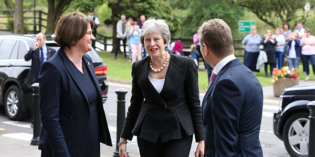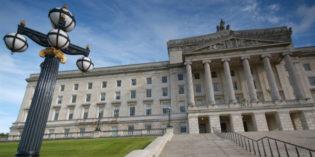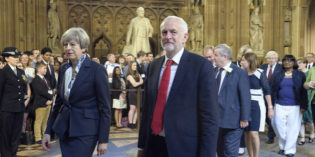Northern Ireland

Conservative Brexiteers are offering unserious answers to serious questions in Northern Ireland: the consequences for the Union are significant
Proposals from backbench Brexiteer MPs as to how to resolve the border question in Northern Ireland fail to address the problem of maintaining a common set of standards with Ireland post-Brexit. Sean Swan argues that, given public opinion in England, a customs border in the Irish Sea, with divergence between Great Britain and Northern Ireland, is a likely outcome.

Local journalists have key role to play in combating ‘fake news’ in Northern Ireland
With Northern Ireland politics at a dangerous stalemate, Paul Reilly argues that the countering of disinformation by both politicians and an independent local media, and a robust and independent press complaints procedure, is vital for ensuring trust in the news media and creating a healthy information environment.

The backstop is dividing Northern Ireland. We urgently need new talks
Brexit has become highly politicised in Northern Ireland. A damaging chasm is opening up between the two political blocs, and between the British and Irish governments, on the EU backstop. Mary C Murphy argues that a compromise formula is possible, but the lack of devolved government means new efforts – and new forums – will be needed to break the stalemate.

The Supreme Court’s decision on Northern Ireland’s abortion law – what now?
Kathryn McNeilly, Fiona Bloomer and Claire Pierson explain the background and implications of the recent ruling which, although found Northern Ireland’s abortion law to be incompatible with human rights law, dismissed the case on technical grounds.

Ireland votes to repeal the 8th: will Northern Ireland be next to liberalise its abortion laws?
Ireland’s abortion referendum on 25 May resulted in a victory for the ‘Yes’ side campaigning to reform the country’s strict abortion laws by repealing the Eighth Amendment of the Irish constitution. For Jennifer Thomson, the result underlines a dramatic transformation that has taken place in Irish society over recent decades, however it also shines a light on Northern Ireland, which now looks increasingly isolated in its lack of liberalisation around abortion and LGBT rights.

Hume’s legacy: British-Irish relations need strengthening to face the challenges of Brexit
The formal side of British-Irish relations needs strengthening to face the challenges of Brexit. In this post, in the week the 20th anniversary of the Good Friday Agreement is marked and ahead of the UK’s impending exit from the EU, Etain Tannam invokes John Hume’s peacebuilding legacy to better explain the current state of British-Irish relations. She argues that Hume’s concept of the totality of British-Irish relations has taken on new importance and is as significant as it was thirty years ago.

Critical actors and abortion law: a group of individuals in Northern Irish politics obstructs change
There are various reasons why progress on legal abortion in Northern Ireland has been blocked over the years. Key among them is that individual politicians rule out any suggestion of change, writes Jennifer Thomson. She argues that more attention should be given to the actions of individual actors, considering their role can often be as important as that of political parties or institutions.

Gender and power-sharing – why a Citizens’ Assembly is needed in Northern Ireland
The prospects for Northern Ireland’s power-sharing democracy look bleak. A Citizens’ Assembly is planned for members of the public to deliberate on the disputed topics. Claire Pierson and Jennifer Thomson argue that these forms of public participation have a particular benefit for the representation of women, and has the potential to break down entrenched party political divides.

Sinn Féin MP’s resignation demonstrates the dangers of social media for politicians
On 15 January, Barry McElduff, Sinn Féin MP for West Tyrone, resigned after a video he posted on Twitter offended victims and families of the 1976 IRA Kingsmill massacre. Paul Reilly (University of Sheffield) examines what this incident means for politicians who make use of social media in Northern Ireland.

The illusionary norm of political stability: the unruly democratic politics of the United Kingdom
Democratic politics in the UK is currently rife with conflict because this multi-national state encourages it, writes Helen Thompson (University of Cambridge). Maintaining political stability has historically required prudence and pragmatic restraint. Minority governments and more frequent elections have occurred when the UK’s economic and political relationships with the rest of the world are disputed, and […]


 Democratic Audit's core funding is provided by the Joseph Rowntree Charitable Trust. Additional funding is provided by the London School of Economics.
Democratic Audit's core funding is provided by the Joseph Rowntree Charitable Trust. Additional funding is provided by the London School of Economics.